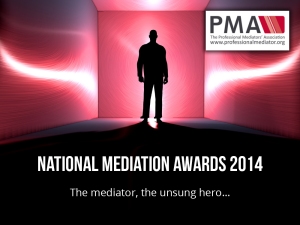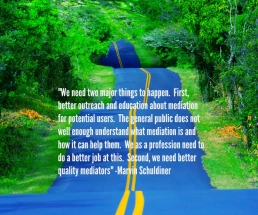dispute resolution
PMA celebrates top talent in mediation in an evening to remember
Earlier this year, the PMA was eagerly encouraging mediators to nominate themselves for its National Mediation Awards ceremony it held on Thursday 25th September at the West End.
The event featured world class mediators speaking on the need to professionalize mediation and champion excellence in the profession.
Read more about the ceremony here on the PMA website http://www.professionalmediator.org/article.php?article_id=46&article_url=the-pma-national-mediation-awards-2014
Did you attend the event? What did you think?

Visa: Dispute Resolution Executive vacancy in London office
Visa is recruiting for a Dispute Resolution Executive who will be responsible for the provision of independent dispute resolution services through independent advice to the Membership and case ruling for both European and International Transactions.
Key Accountabilities:
- Process cases filed with Visa Europe and prepare cases as appropriate for rulings;
- Rule on cases within appropriate thresholds ensuring correct escalation procedures are followed;
- Collaborate with Visa Inc. to ensure rulings are consistent, escalating to senior management where necessary;
- Work with internal stakeholders at Visa Europe to agree and deliver common business rules for dispute resolution, ensuring the provision of clear, comprehensive and operationally valid decisions and rulings;
- Provide advice and support to the Membership and internal departments, ensuring that the integrity of Visa Europe’s dispute resolution process is maintained and continues to be effective;
- Assist with the provision of advice and troubleshooting for the electronic case filing system (VROL) software, testing any upgrades and ensuring that access to the filing process is maintained.
The full job specification is outlined here https://visacareers.resourcesolutions.com/gold/cbjbaaa/jobsearch/jobdetails.cfm?oJobCode=770958&JS=1
Professional mediation: Confronting a mediator’s achilles heel
 This week the PMA (Professional Mediators’ Association) launched a regional hub in Manchester to support professional mediators in the North West region of the UK. The launch of PMA North West is the culmination of joint efforts between the PMA and the Manchester Mediation Network to improve better access to mediation for all.
This week the PMA (Professional Mediators’ Association) launched a regional hub in Manchester to support professional mediators in the North West region of the UK. The launch of PMA North West is the culmination of joint efforts between the PMA and the Manchester Mediation Network to improve better access to mediation for all.
We will provide more details about the launch in our upcoming newsletter however what we would like to share is the feedback we had from attendees (mixture of mediators and non mediators) on issues which affect mediation as a profession.
Top 5 issues highlighted by the audience
- Lack of access to data for mediators, this is in relation to facts directly related to the practice and use of mediation
- General lack of awareness about mediation, majority thought mediation still suffers from a fairly low profile as far as the general public is concerned.
- Skepticism about the benefits of mediation to potential purchasers of mediation servicers like HR practitioners
- Difficulty in penetrating the market and overcoming rebuttals from large organizations who favour the use of grievance policies
- Mediation needs more lobbying to promote its use in the UK
We also asked for the solutions in order to combat this and the top 5 were:
- Provision of data in relation to the ROI on the use of mediation
- Promoting mediation especially through governmental institutions like ACAS and BIS, majority felt this could give mediation a massive credibility in the eyes of the British public.
- In relation to skepticism from large organizations, the PMA President(David Liddle) advised that mediators need to shift the focus from the benefits of mediation to offering tailored solutions on what mediation has to offer to respective organizations
- It was also recommended that clear definitions of what mediation is and what a professional mediator is should be available to consumers(If you need help on this the PMA code of conduct outlines who a professional mediator is, it can be found here)
- Promoting the benefits of mediation to businesses by creating forums which facilitate this.
Do you think these problems still exist and do you agree with the suggested solutions? Get in touch comment below or email us at admin@professionalmediator.org
My professional journey in mediation: Marvin Schuldiner
In line with our ‘my professional journey in mediation’ series we launched last week.You have the opportunity to hear about Marvin Schuldiner,if you found any of his comments interesting please reach out to Marvin to feedback via his details below or in the comment section of of this post.
Your main area  of mediation: I perform mediations as a civil/commercial/business mediator, divorce/family mediator and an elder mediator.
of mediation: I perform mediations as a civil/commercial/business mediator, divorce/family mediator and an elder mediator.
How did you get into mediation: I worked in the corporate world for about 15 years doing a variety of things around supply chain management (consulting, sales, operations and strategic planning, accounting) when my last company downsized and laid me off. At that point, I was looking for something different to do. After speaking with a lot of people, I was introduced to ADR. I researched it in greater depth and thought that it matched my skill set.
Mediation training: My basic training was done at New York University. I took 5 courses (Foundations of Dispute Resolution, Mediation, Negotiation, a mediation apprenticeship in small claims court and a mediation externship at the Equal Employment Opportunity Commission) and earned a Certificate in Conflict and Dispute Resolution. I subsequently took divorce mediation training from the New Jersey Association of Professional Mediators, elder mediation training from the Montgomery County (Pennsylvania) Mediation Center and transformative mediation training from Professor Bush at Hofstra Law School. I enjoyed all the courses I took and found the most helpful elements were the practical training (supervised mediation of real cases and role plays to a lesser degree).
What does mediation need to grow as a profession: We need two major things to happen. First, better outreach and education about mediation for potential users. The general public does not well enough understand what mediation is and how it can help them. We as a profession need to do a better job at this. Second, we need better quality mediators. The biggest complaint I hear is that mediators become too directive and do not give the parties space to come up with their own solutions. We need better training and better mentoring.
What motivates me as mediator and what inspires me: Mediation is a helping profession and I like helping people. I resolve most of my cases. It is very satisfying to know that I am helping people get beyond a major roadblock in their life and that they are happier even if the solution isn’t perfect. My inspiration is my father. He was a buyer for many years and he taught me about negotiation and dealing with people.
How do I generate business: My business comes from the state courts (mostly civil cases) and private referrals (mostly family cases). The divorce cases usually come through internet searches with a few word-of-mouth referrals.
What are my pet peeves: My biggest pet peeve is mediators who do not know what they are doing and thus give a bad name to mediation. Once that client is lost to mediation, they will not come back.
How do you overcome obstacles: My undergraduate degree is in engineering and my MBA is in finance. Engineering is basically applied problem solving. Finance is really risk management. I use these skills to help my clients reframe their dispute in those terms (problem solving and risk management). Since most people are risk averse and want to solve their problems, these are effective tools in the mediation room.
What do I do when not mediating/working: I spend time with my wife and 4 year old son. I am the President of the New Jersey Association of Professional Mediators and I am also NJAPM’s Civil Mediation Training Director, teaching the basic training and some advanced courses. Outside of mediation, I do website development work for small and medium sized clients. I also have a passion for horse racing and technology.
Anything else… For the last two years, I have been honored to be a judge in the International Chamber of Commerce Mediation Competition for law school students. The competition is held in Paris and attracts professionals and students from around the world (60+ countries). When meeting with professionals from all over, mediation has the same set of challenges regardless of the country, continent or culture. Getting the word out, getting past the gatekeepers on civil/commercial cases and overcoming ignorance remains a challenge everywhere.
One tip for up and coming mediators: Mediation is a skill and profession that is separate from others. It is not law. It is not accounting and it is not mental health. It requires more than 40 hours of training to be skilled. It requires a lot of practice. Just because a person is good at law/accounting/mental health does not automatically equate to being a good mediator.
More about Marvin
Marvin Schuldiner is the Principal of Sanns ADR Services based in Montgomery, New Jersey, USA. He performs civil/commercial, family/divorce and elder mediations in NJ and worldwide. He is also a mediation leader and trainer.
You can contact him via
Twitter: @sannsllc or his website
Websites: sannsmediation.com, sannsADR.com
My professional journey in mediation: Lou Schmitt
Collaboration is one of the core aims of the PMA, and we constantly aspire to cultivate a collaborative hub of professional mediators. This week,we reached out to mediators on social media to share their experience in mediation,we would like to send massive thanks to all those who participated. If you would also liked to be featured please email Mercedes.Brown@professionalmediator.org.
Each Friday we will feature a mediation professional and their responses,if you have any questions you would also like other mediators to address feel free to send them our way!
This friday feature is on Lou Schmitt,my favourite quote from Lou in this interview is his response to obstacles in mediation “Flexible Perseverance”. If you enjoyed hearing about Lou’s journey in mediation feedback below or directly to Lou via lou@adrsolutionspa.com.
Sum mediation up in a tweet…
An environment where parties can exchange information, discuss options, talk about possible outcomes, and reach an agreement as to what is best for all parties involved.
How did you get into mediation?
Approximately 10 years ago a local county judge contacted me and asked if I would be willing to serve in the county court’s pro bono mediation program, mediating civil lawsuits. My previous background was as an attorney handling litigation in such matters.
At the time, not only was I uninterested in becoming a mediator, I had no faith in mediation as a real alternative to resolution by jury trial, which is how I had been trained to resolve legal disputes. I agreed to mediate legal cases simply out of deference to the requesting judge. I didn’t think I would be an effective mediator – and I was a reluctant one at best. I began to do the pro bono mediations, and was quite lost at first, not having any training or experience. I literally learned to mediate by doing mediations. I made a lot of mistakes, but eventually came up with my own method and manner of conducting the mediations. I early on saw the “magic of mediation”, as I often was able to help get even the most difficult of cases resolved. I became fascinated with how the mediation process was changing the dynamics of the disputes. Judges started sending me more cases to mediate, lawyers began to ask me to mediate other cases, and I eventually decided to get proper training and then started my own firm: ADR Solutions.
Where did you get your mediation training?
I received my basic mediation training at the Lancaster Mediation Center in Lancaster, PA USA. I received advanced mediation training through the Pepperdine University School of Law’s Straus Institute for Dispute Resolution. I found the Lancaster Mediation Center training through an internet search. I received a mail solicitation for the advanced training, which was conducted at the University Of Maryland Francis King Carey School Of Law in Baltimore, MD.
What are your areas of interest?
I mediate in the areas of litigated civil matters, including personal injury, commercial, and professional negligence. I also mediate divorce and custody disputes. These are my areas of interest and substantive expertise.
What does mediation need to grow as a profession?
In my home state of Pennsylvania, there are absolutely no professional requirements for mediators. Anyone, without any training or experience whatsoever, can practice as a mediator. I would like to see the mediation profession be licensed, and certain minimum qualifications be established in every jurisdiction, so that mediation can truly be professionalized. I would like to see training organizations be certified by licensing authorities, as again, these are unregulated. And I would like to see mediators make continual efforts to inform and educate as many people as possible about the mediation process and its potential to resolve conflicts at every level of society and in all manner of disputes.
What are your pet peeves as a mediator?
Lawyers who aren’t prepared.
Parties who have decided to proceed with mediation as a stalling or delaying tactic.
Parties who do not participate in the mediation process in good faith.
People with no training and little or no experience who hold themselves out as qualified mediators.
Mediators who think the process is about them and not the parties involved.
How do you overcome obstacles in your area of practice?
Flexible Perseverance – The ability to move on from what is not working, to keep searching for what might work, and to press home what you believe will work.
What do you do when you are not working or mediating?
I enjoy exercising, meditating, reading, listening to music, travelling, and my German Shepherd Dog.
Your experience of mediation in one word?
Rewarding
One tip for up and coming mediators?
Make serving others your top priority as a mediator.
What you should know about Lou…
Louis C. Schmitt, Jr. is a 1984 graduate of St. Francis University in Loretto, PA. He received his Juris Doctor degree from the University of New Hampshire School of Law in 1987. He has an extensive background as a civil trial attorney and as a member of the Pennsylvania Council of Mediators. He has also served for a number of years as a court-appointed and private arbitrator and mediator, and has received certification in mediation and advanced mediation. He is a partner in the Hollidaysburg, PA law firm of McIntyre, Hartye, Schmitt & Sosnowski, and is the founder and principal of ADR Solutions – www.adrsolutionspa.com. He has authored articles on mediation for professional publications, including The Pennsylvania Lawyer. He lives in Altoona, PA with his wife Helen. He can be reached via e-mail at lou@adrsolutionspa.com.
Contact us if you want to share your journey too…
What are the perks of being a mediator?
Although it maybe be occasionally described as emotionally draining most mediators credit a high level of job satisfaction from their role,here are a few perks noted in relation to mediation do you agree or are there more you can think of ?
Opportunity: Lead discussion on “how to grow a successful mediation business”
Mediation is often seen as a niche area of dispute resolution and mediators often find it challenging to promote their services as a result. The PMA would like to organise a forum for experienced and inexperienced mediators to share opinions on best practice in terms of marketing mediation services.
Objectives of the event include:
- Tips on how to strategically market your mediation services
- Real time discussions on the current market with other experienced mediators
- Guidance on how to sell mediation as a tool for dispute resolution to companies and individuals
- Get help on overcoming objections to mediation
Please contact me (mercedes.brown@professionalmediator.org) if you would like to join other high calibre mediators in leading this forum or by presenting on any of the objectives outlined.
Male and Female Responses to Conflict?
Posted on
-Aggression
-Direct conflict
-Indirect conflict
-Conflict avoidance
She categorizes aggression and direct conflict as masculine ways of handling conflict. Indirect conflict and conflict avoidance are categorized as feminine ways of conflict management. In essence, labeling conflict avoidance and passive aggression as feminine responses in comparison to more extroverted means of handling conflict which are in this respect,seen as male.
What do you think? Does gender impact responses to conflict in anyway.
The original post can be found here http://www.huffingtonpost.com/caroline-turner/masculine-and-feminine-st_b_6633896.html
This entry was posted in Comment and Debate, Updates and tagged Caroline Turner, Conflict avoidance, conflict management, dispute resolution, handling conflict, masculine and feminine, workplace dispute resolution, workplace mediation.